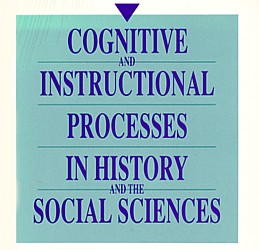References
(back to top)
p. 75: M.G. McKeown and I.L. Beck, "The assessment and characterization
of young learners' knowledge of a topic in history." AERJ 27(1990),
688-726.
p. 101: B. Inhelder and J. Piaget, De la logique de l'enfant a la
logique de l'adolescent (Paris: Presses Universitaires de France,
1955): The growth of logical Thinking from Childhood to Adolescence
(London: Routledge, 1972).
p. 158: G. Leinhardt, "History: A Time to be Mindful," in:
Leinhardt, I.L.Beck, C. Stainton (eds.), Teaching and Learning in
History (Hillsdale,NJ: Erlbaum, 1994), 209-255.
p. 182: T. Holt, Thinking Historically (New York: College Entrance
Examination Board, 1990).
p. 217: L. Cuban, "History of Teaching in Social Studies,"
in: J. Shaver (ed.), Handbook of Research on Social Studies Teaching
and Learning (NY: Macmillan, 1991), 197-209.
p. 218: K.P.Scott, "Achieving Social Studies Affective Aims: Values,
Empathy, and Moral EDevelopment," in: J. Shaver (ed.), Handbook
of Research on Social Studies Teaching and Learning (NY: Macmillan,
1991), 357-369. [UCSB doesn't have, 2/2/05]
p. 232: D. Middleton and D. Edwards (eds.), Collective Remembering
(London: Sage, 1990).
Conversational remembering : a social psychological approach
/ David Middleton and Derek Edwards -- Artefacts, memory and a sense of
the past / Alan Radley -- Collective memory, ideology and the British
royal family / Michael Billig -- The reconstruction of Abraham Lincoln
/ Barry Schwartz -- Ronald Reagan misremembered / Michael Schudson --
The social construction of remembering and forgetting / John Shotter --
Organizational forgetting : an activity-theoretical perspective / Yrjo¨
Engestro¨m ... [et al.] -- Sharing knowledge, celebrating identity
: community memory in a service culture / Julian E. Orr -- Folk explanation
in language survival / Carol A. Padden -- Social memory in Soviet thought
/ David Bakhurst. [UCSB: HM251 .C54 1990]
|
